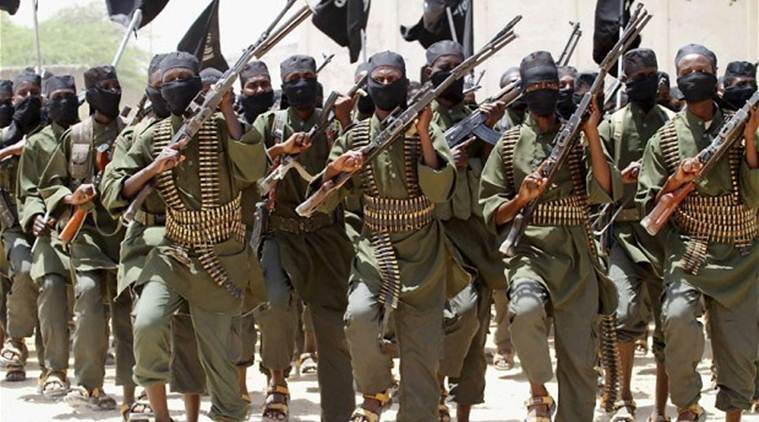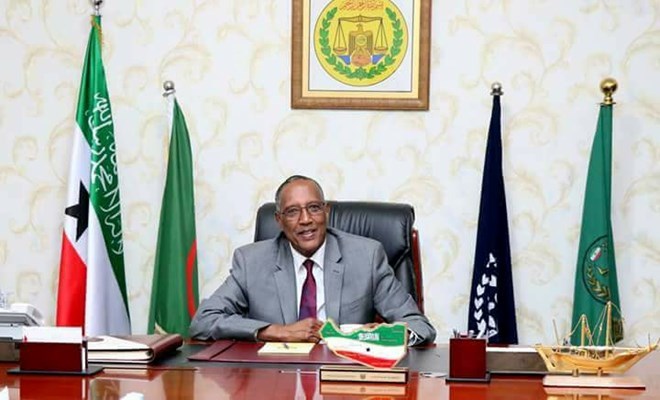Somalia's so-called 'federal government', is weak, corrupt and has failed
Somalia's weak, so-called ' federal government', continues to face many challenges. Although it is ostensibly the internationally recognised government, it barely controls more than a few neighbourhoods in and surrounding the capital. In a country with a land area of 640,000 KM squared - which, to give some context, is three times the size of the United Kingdom and approximately two times the size of Germany in terms of land area. Somalia also has the longest coastline in Africa, of which again the so-called 'federal government' controls precisely none. Not even one nautical mile.
The result is that Somalia's so-called government is effectively a make-belief government. It exists on paper only and controls the country in name only. The vast majority of South-Central Somalia is still controlled by the terrorist organisation Al Shabab, which some of Somalia's government members have links with. This is extra-ordinary for a country that has existed since 1960, with decades to develop effective government institutions. This article will seek to explore some of the reasons for this bizarre state of affairs for Somalia's so-called 'federal government', which continues to flounder despite billions in international aid, countless international conferences and seemingly endless interventions by the International Community.

The Farmaajo regime is financially and militarily propped up and dependent on foreign support. This means the regime is highly amenable to suggestions of its international handlers, susceptible to handing out contracts for oil, minerals and sea resources even at the detriment of its own people and country. It is propped up by thousands of foreign troops in the form of AMISOM and has based itself in the heart of conflict-ravaged Mogadishu - which has become a byword for warfare, chaos and terrorism. Troops from Uganda, Kenya, Ethiopia, Burundi, Sierra Leone and other African countries project Somalia's president Farmaajo (whose nick-name means cheese, in Italian, presumably because of his reputation of being pliable, like cheese). To any external analyst, it will be clear that the International Community only tolerates and even favours this weak, unelected, unaccountable form of 'government', because it works in their favour.

Over recent years there have been many questions about corruption which is endemic within Somalia's so-called government. Recently it was widely reported in media that the government had, in a type of agreement hitherto unheard of, granted exclusive tune fishing rights to a Chinese company. Encompassing the country's entire coastline of 3,300KM - the longest in mainland Africa. There was no competitive bidding process for these fishing rights. No detailed or long negotiations. And consequently no material financial or economic gain for Somalia. The government's revenues would be a paltry $1m, which are yet unaccounted for. In exchange Chinese companies would obtain fishing resources reported worth at least several hundreds of millions of dollars per year.
Another example was the exclusive operating rights of Mogadishu's airport, sea-port and numerous hospitals issued by the so-called federal government of Somalia, to Turkish companies, in rather opaque deals. Again there was no transparency on the financial and economic benefit for the country. The deals were shrouded in silence as to how revenues would be shared. Even today the revenues from the nature of these contracts are unknown and revenues from the contracts continue to be unaccounted for in their entirety. International analysts noted "Turkey is suspected by some to have funded the election campaigns of certain candidates in exchange for favourable business deals or other geopolitical interests, thereby indirectly fuelling corruption [in Mogadishu]".

The final example, was a deal struck by the Mogadishu's government with an American legal firm, to track down and re-patriate national funds that were frozen at the 1991 at the fall of Somalia's late communist dictator, Siad Barre. These funds had apparently amounted to hundreds of millions of dollars in numerous international bank accounts. These funds had been frozen by international debtor organisations for decades and were over the past few years repatriated to the Mogadishu based regime and transferred to other international bank accounts. The funds are until today unaccounted for and despite their repatriation, the central government continues to be entirely funded by bilateral and international aid. The United Nations has raised alarm numerous times, including in a confidential UN report covered by Al Jazeera, that states that "Somalia's [former] President Hassan Sheikh Mohamud, his former foreign minister and an American law firm conspired to steal public funds by engaging in secret contracts that gave them hefty percentages from the country's recovered overseas assets".
The result of all of these factors, is a paper government in Mogadishu, which has utterly failed to carry out its duties or fulfil its responsibilities as any mature government does. Instead, it is weak, corrupt and inefficient. One can only reach the conclusion that centralism in Somalia has not, will not and cannot work. The unelected government in Mogadishu is accountable only to its foreign funders and puppet masters and the corrupt president and ministers only seem interested in lining their pockets. They do not have the interests of the Somali people at heart.
This is further complicated by the question of Somaliland. Anyone who has looked into the history of the failed state known today as Somalia, will know that this country was formed when to formerly independent countries of Somaliland and Somalia united on the 1st of July 1960. Somaliland previously was British Somaliland protectorate and prior to that had centuries of history as an independent country, including as the Adal Sultanate and Ifat sultanate as far back as the 14th century, whilst Somalia was the Ajuuraan sultanate. After the union in 1960 of Somaliland and Somalia the people of Somaliland were discriminated against, with almost all powerful positions, ministries and investments going to Mogadishu. Whilst Somaliland's capital of Hargeisa was forbidden from even building buildings higher than 2 storeys high. This imbalanced and deeply flawed union ultimately failed and led to the Somali civil war.
The failed union culminated in the 1988 massacre and eventual attempted genocide of Somaliland's people by the Mogadishu government of Somalia. Somalia's late communist dictator, Siad Barre, tried to wipe out the people of Somaliland. Through a strategy his government termed 'the final solution'. Nevertheless, Somalilanders survived and re-asserted their statehood in 1991 by reverting back to the 1960 borders of Somaliland.
Since then Somaliland has been a relative success. It has been peaceful, stable, democratic and self-governing. It has its own parliament, flag, military, police and government led by numerous democratically elected presidents. Consequently it is often referred to as an oasis of peace and stability in an otherwise volatile Horn of Africa - a beacon for democracy in a part of the world that has a deep history of autocratic and dictatorial government.

Any fair-minded external analyst would see that it is clear, Somaliland can never be part of Somalia's failed project in Mogadishu. Somaliland has all the merits of a country and should be recognised. Not least because it's a much more reliable partner for the international community as it seeks to safeguard the strategic Horn of Africa.
Somalia's weak, so-called ' federal government', continues to face many challenges. Although it is ostensibly the internationally recognised government, it barely controls more than a few neighbourhoods in and surrounding the capital. In a country with a land area of 640,000 KM squared - which, to give some context, is three times the size of the United Kingdom and approximately two times the size of Germany in terms of land area. Somalia also has the longest coastline in Africa, of which again the so-called 'federal government' controls precisely none. Not even one nautical mile.
The result is that Somalia's so-called government is effectively a make-belief government. It exists on paper only and controls the country in name only. The vast majority of South-Central Somalia is still controlled by the terrorist organisation Al Shabab, which some of Somalia's government members have links with. This is extra-ordinary for a country that has existed since 1960, with decades to develop effective government institutions. This article will seek to explore some of the reasons for this bizarre state of affairs for Somalia's so-called 'federal government', which continues to flounder despite billions in international aid, countless international conferences and seemingly endless interventions by the International Community.

The Farmaajo regime is financially and militarily propped up and dependent on foreign support. This means the regime is highly amenable to suggestions of its international handlers, susceptible to handing out contracts for oil, minerals and sea resources even at the detriment of its own people and country. It is propped up by thousands of foreign troops in the form of AMISOM and has based itself in the heart of conflict-ravaged Mogadishu - which has become a byword for warfare, chaos and terrorism. Troops from Uganda, Kenya, Ethiopia, Burundi, Sierra Leone and other African countries project Somalia's president Farmaajo (whose nick-name means cheese, in Italian, presumably because of his reputation of being pliable, like cheese). To any external analyst, it will be clear that the International Community only tolerates and even favours this weak, unelected, unaccountable form of 'government', because it works in their favour.
Over recent years there have been many questions about corruption which is endemic within Somalia's so-called government. Recently it was widely reported in media that the government had, in a type of agreement hitherto unheard of, granted exclusive tune fishing rights to a Chinese company. Encompassing the country's entire coastline of 3,300KM - the longest in mainland Africa. There was no competitive bidding process for these fishing rights. No detailed or long negotiations. And consequently no material financial or economic gain for Somalia. The government's revenues would be a paltry $1m, which are yet unaccounted for. In exchange Chinese companies would obtain fishing resources reported worth at least several hundreds of millions of dollars per year.
Another example was the exclusive operating rights of Mogadishu's airport, sea-port and numerous hospitals issued by the so-called federal government of Somalia, to Turkish companies, in rather opaque deals. Again there was no transparency on the financial and economic benefit for the country. The deals were shrouded in silence as to how revenues would be shared. Even today the revenues from the nature of these contracts are unknown and revenues from the contracts continue to be unaccounted for in their entirety. International analysts noted "Turkey is suspected by some to have funded the election campaigns of certain candidates in exchange for favourable business deals or other geopolitical interests, thereby indirectly fuelling corruption [in Mogadishu]".

The final example, was a deal struck by the Mogadishu's government with an American legal firm, to track down and re-patriate national funds that were frozen at the 1991 at the fall of Somalia's late communist dictator, Siad Barre. These funds had apparently amounted to hundreds of millions of dollars in numerous international bank accounts. These funds had been frozen by international debtor organisations for decades and were over the past few years repatriated to the Mogadishu based regime and transferred to other international bank accounts. The funds are until today unaccounted for and despite their repatriation, the central government continues to be entirely funded by bilateral and international aid. The United Nations has raised alarm numerous times, including in a confidential UN report covered by Al Jazeera, that states that "Somalia's [former] President Hassan Sheikh Mohamud, his former foreign minister and an American law firm conspired to steal public funds by engaging in secret contracts that gave them hefty percentages from the country's recovered overseas assets".
The result of all of these factors, is a paper government in Mogadishu, which has utterly failed to carry out its duties or fulfil its responsibilities as any mature government does. Instead, it is weak, corrupt and inefficient. One can only reach the conclusion that centralism in Somalia has not, will not and cannot work. The unelected government in Mogadishu is accountable only to its foreign funders and puppet masters and the corrupt president and ministers only seem interested in lining their pockets. They do not have the interests of the Somali people at heart.
This is further complicated by the question of Somaliland. Anyone who has looked into the history of the failed state known today as Somalia, will know that this country was formed when to formerly independent countries of Somaliland and Somalia united on the 1st of July 1960. Somaliland previously was British Somaliland protectorate and prior to that had centuries of history as an independent country, including as the Adal Sultanate and Ifat sultanate as far back as the 14th century, whilst Somalia was the Ajuuraan sultanate. After the union in 1960 of Somaliland and Somalia the people of Somaliland were discriminated against, with almost all powerful positions, ministries and investments going to Mogadishu. Whilst Somaliland's capital of Hargeisa was forbidden from even building buildings higher than 2 storeys high. This imbalanced and deeply flawed union ultimately failed and led to the Somali civil war.
The failed union culminated in the 1988 massacre and eventual attempted genocide of Somaliland's people by the Mogadishu government of Somalia. Somalia's late communist dictator, Siad Barre, tried to wipe out the people of Somaliland. Through a strategy his government termed 'the final solution'. Nevertheless, Somalilanders survived and re-asserted their statehood in 1991 by reverting back to the 1960 borders of Somaliland.
Since then Somaliland has been a relative success. It has been peaceful, stable, democratic and self-governing. It has its own parliament, flag, military, police and government led by numerous democratically elected presidents. Consequently it is often referred to as an oasis of peace and stability in an otherwise volatile Horn of Africa - a beacon for democracy in a part of the world that has a deep history of autocratic and dictatorial government.

Any fair-minded external analyst would see that it is clear, Somaliland can never be part of Somalia's failed project in Mogadishu. Somaliland has all the merits of a country and should be recognised. Not least because it's a much more reliable partner for the international community as it seeks to safeguard the strategic Horn of Africa.
Last edited:



